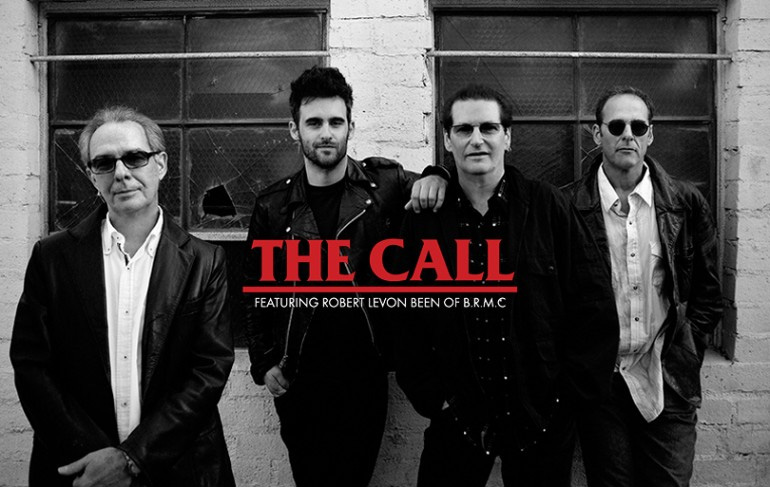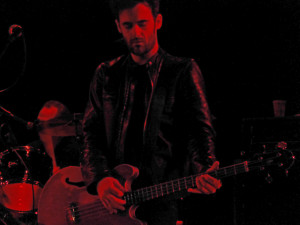BRMC’s Robert Levon Been joins his father’s bandmates to bring back The Call

The Call with Robert Levon Been, courtesy.
Seminal ‘80s Santa Cruz rockers The Call disbanded in 2000 when frontman-bassist Michael Been decided to focus his energy on his son’s fledgling career. So in a roundabout way, Robert Levon Been is returning the gesture, when he briefly steps away from the Black Rebel Motorcycle Club for two shows this week to join his father’s bandmates and bring The Call back to life – or so it would seem.
But the younger Been, who performs with The Call Thursday at Slim’s and again in Los Angeles the following night, before BRMC’s sold-out show at the Fillmore on April 22, said this reunion is not about his father at all. It’s about the music and Michael Been’s bandmates – drummer Scott Musick, guitarist Tom Ferrier and keyboardist Jim Goodwin – who never wanted to stop.
In fact, Been is trying not to ask the biggest question: What would his father, who passed away from a heart attack in 2010 while working as a sound engineer at BRMC show, think?
“It’s not really about him anymore,” he said. “He created something else, and it feels like it’s about this music and the band; whatever incarnation that it’s in. (The band) stays alive; the music stays alive.”
The Call never exceeded cult status in its heyday, but the band had many admirers from critics and musicians such as Peter Gabriel and Simple Minds, who extolled the band for its passionate songwriting and live performances.

Robert Levon Been of Black Rebel Motorcycle Club performs with The Call at Slim’s in San Francisco on April 18, 2013. Roman Gokhman/STAFF.
Michael Been and Musick, both originally from Oklahoma, met in 1979 in Santa Cruz and began writing music. Been, the primary songwriter, was influenced by the likes of Elvis, Chuck Berry, The Band and bluesman Muddy Waters. The Call received considerable airplay in the early years of MTV with songs like “Let The Day Begin” and “I Still Believe (Great Design).”
The younger Been was born in 1978, one year prior to The Call. He grew up on the road with his father’s band, where his earliest love was not music, but room service.
“Being a little kid, you know, people bring you food and they’ll go into your room and make your bed, and you don’t have to clean up – and swimming pools,” he said. “We didn’t have a lot of money so that was like this weird other world that was so fun to just goof around in. Go up and down the elevators and jump to see if it starts going down.”
Rock and roll came later. Robert Been began playing bass, like his father, when he was 14. One night his father had him play bass on-stage. That would not be repeated.
“I wasn’t always looking at them on stage thinking, ‘Gosh, I wish I could do that,’” he said.
After staying quiet for most of the ‘90s, The Call released a best-of album and a tenth, final long-play before disbanding.
When Robert Been started BRMC in 1998, his father helped him and guitarist Peter Hayes develop their own sound. Even though he was respectful and let them find their own way, the son did everything he could to distance himself. On the first two records, he did not even use his real last name, choosing to go by Robert Turner instead.
“I felt that I had so much to prove; I was so consumed,” he said. “Of course subconsciously I grew up with his music, so it’s going to be in there somewhere. But consciously, I was always pushing against it.”
Time has apparently mellowed that feeling, because the first single from Black Rebel Motorcycle Club’s new album, Specter at the Feast, is a cover of “Let The Day Begin.”
After his father died, Robert Been reconnected with his dad’s bandmates, whom he considers a second family. They decided to get together and play for fun the following year.
“When we did, it sounded…really powerful,” he said. “I didn’t expect to be able to pull my own weight. My father’s bass playing and vocal range is fairly difficult, so I was kind of surprised that I fit in his shoes at all.”
It became kind of obvious to them that they should share the music with others again. But first, BRMC had to finish recording Specter at the Feast.
“This is the only time I’ve had in the year to even attempt something like it. It’s been crazy how consuming the BRMC record has been,” he said.
A week prior to The Call shows, Been and BRMC had just flown in from Europe after finishing a run of shows the previous night. Jet lag was causing him to stay awake, and he had yet to meet with the members of The Call to rehearse.
“I’ve done some of my favorite shows when I was growing up at Slim’s, so I feel safe there; psychologically safe,” he laughed.
Two weeks later, BRMC’s tour begins again with the Fillmore show. That’s why there is no time for more shows with The Call, although he would like to play more in the future.
While the band had yet to convene at the time of this interview, Been has been performing “intense memory” exercises to prepare for the shows. He admits he’s terrified and overwhelmed to play his father’s songs. The band plans to play 19 songs, and it’s important to Been to do them justice.
“It’s strange because some of them are in my skin, and I couldn’t get them out if I tried,” he said. “And then others I thought I knew (but) I haven’t listened as closely as I am now, and there’s a lot going on. There’s a lot more to it than it appears on the surface.”
Been said The Call will play mostly the songs fans are familiar with, as well as a couple of the others’ favorites that his father wouldn’t let them play. Part of his nervousness may be due to his father’s stickler personality; that’s why he’s trying not to imagine Michael Been watching this reunion.
“It’s funny because he was such a fucking little perfectionist,” he laughed. “If I think too much about that, I can think of criticisms.”
It was his father, he reminded, who made the call to end The Call – the others weren’t done yet. And when he first joined them to play after the death of his father, he sensed their desire for the music.
“I felt so much joy coming from them,” he said. “Their hearts are still in it. This isn’t about me; this isn’t about my dad. This is theirs. They’re still in love with it. It’s like still being in love with that same girl after all these years.”
Follow Roman Gokhman at Twitter.com/RomiTheWriter.
